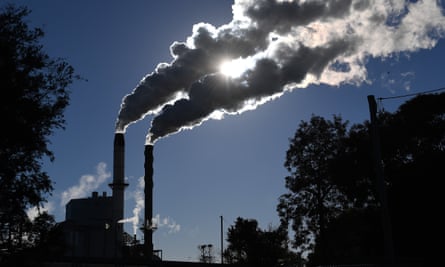Extract from The Guardian
International Monetary Fund (IMF)
International Monetary Fund warns window for holding temperature increases to safe levels is ‘rapidly closing’

Last modified on Wed 14 Oct 2020 00.14 AEDT
The International Monetary Fund says a combination of carbon pricing and an “initial green stimulus” would turbocharge economic recovery from the coronavirus, and help put the global economy on a sustainable growth path post-pandemic.
The IMF has used the World Economic Outlook, which analyses the impact of the pandemic on the global economy, to castigate existing policies to reduce emissions as “grossly insufficient to date”.
It warns the window for attaining net zero emissions by 2050 and holding temperature increases to safe levels is “rapidly closing”. It notes that global sea levels are rising, and evidence is mounting that the world is closer to abrupt and irreversible changes, “so-called tipping points”, than previously thought.
Without further action to reduce greenhouse gas emissions, the IMF says, “the planet is on course to reach temperatures not seen in millions of years, with potentially catastrophic implications”.
The IMF says while the pandemic and the global recession accompanying it has reduced emissions, that decline will be temporary, and under status quo policies “emissions will continue to rise relentlessly, and global temperatures could increase by an additional 2–5°C by the end of this century … increasing the risk of catastrophic outcomes across the planet”.
It says if nations, both developed and developing, resolved post-pandemic to pursue a green recovery, applying a combination of carbon pricing and green stimulus, coupled with compensation for lower-income households to make the transition fair, the world would plot a sustainable path out of deep recession and combat the growing climate crisis.
The IMF says green stimulus “would help boost growth and employment in the first few years, when the economy is depressed” even though carbon pricing drives structural adjustment and generates transition costs.
It notes from a macroeconomic and public finance perspective “the next decade is the best time for governments to invest and borrow, given that interest rates for many large emitters are likely to stay low for long, suggesting that an aggressive investment policy would be affordable and desirable”.
It says as the world comes out of the coronavirus recession, governments could ratchet up carbon pricing schemes to drive substantial declines in greenhouse gas emissions with only moderate impacts on economic growth.
“Over the longer term, the economy would be on a higher growth and output path because substantial damages from climate change would be avoided,” it says.
The IMF says relative to the status quo, a green recovery package followed by sustained mitigation would significantly boost incomes in the second half of the century by avoiding damages and catastrophic risks from climate change.
It says the policy mix could include:
Governments creating an 80% subsidy rate on renewables production and a 10-year green public investment program starting at 1% of gross domestic product and declining to zero over a decade.
Carbon prices calibrated to achieve an 80% reduction in emissions by 2050, after accounting for emission reductions from the green fiscal stimulus.
Households receiving compensation equal to one-fourth of carbon tax revenues, with the green recovery bankrolled by debt financing for the first decade given the low inflation and low interest rates outlook.
Australia’s tortured climate politics have led it in the opposite direction. The Coalition signed up to an emissions trading scheme in the final 12 months of the Howard government, but the Liberal and National parties now reject that position.
Australia implemented a carbon pricing scheme during the tenure of the Gillard government that included compensation for households and business, but that policy was repealed by the Coalition in 2013 after Tony Abbott won an election by weaponising the policy as a “carbon tax” and demanding the scheme be repealed.
The Morrison government has thus far refused to commit to a target of net zero emissions by 2050 despite that target being supported by state and territory governments and a range of influential business groups – including groups that once opposed carbon pricing.
A leading Australian business lobby, the Ai Group, has called for the two biggest economic challenges in memory – recovery from the Covid-19 pandemic and cutting greenhouse gas emissions – to be addressed together, saying it would boost growth and put the country on a firm long-term footing.
But the Morrison government is pursuing what it calls a “gas-led” recovery from the pandemic, including increasing gas supply by opening up five new gas basins, starting in the Northern Territory and Queensland.
No comments:
Post a Comment